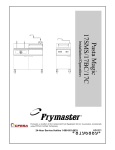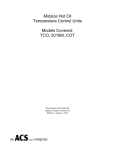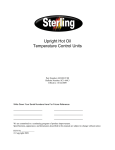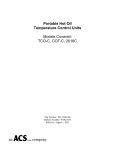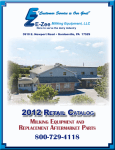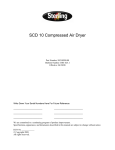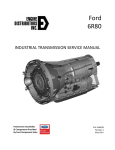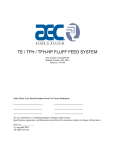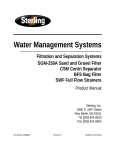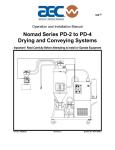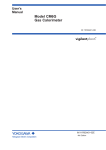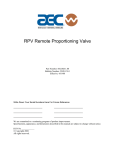Download Sterling Marine Instruments 6017 series User's Manual
Transcript
$30.00 Operation and Installation Manual 6017 Series Large Hot Oil Temperature Control Units Important! Read Carefully Before Attempting to Install or Operate Equipment Part No. 682.91540.00 Revision 3 Bulletin No. SC1-655-3 Write down your unit serial number(s) ________________ ________________ here for future reference ________________ ________________ ________________ ________________ ________________ ________________ Sterling/Sterlco is committed to a continuing program of product improvement. Specifications, appearance, and dimensions described in this manual are subject to change without notice. © Copyright Sterling/Sterlco and Sterling, Inc. 2008 All rights reserved. Effective 4/29/2008 Part No. 682.91540.00 Revision 3 Bulletin No. SC1-655-3 Page 2 6017 Series Hot Oil Large Temperature Control Units Safety Considerations Sterling/Sterlco 6017 Series large hot oil temperature control units are designed to provide safe and reliable operation when installed and operated within design specifications, following national and local safety codes. To avoid possible personnel injury or equipment damage when installing, operating, or maintaining this equipment, use good judgment and follow these safe practices: ; Follow all SAFETY CODES. ; Wear SAFETY GLASSES and WORK GLOVES. ; Disconnect and/or lock out power before servicing or maintaining the hot oil temperature control unit. ; Use care when LOADING, UNLOADING, RIGGING, or MOVING this equipment. ; Operate this equipment within design specifications. ; OPEN, TAG, and LOCK ALL DISCONNECTS before working on equipment. You should remove the fuses and carry them with you. ; Make sure the hot oil temperature control unit and components are properly GROUNDED before you switch on power. ; Do not jump or bypass any electrical safety control. ; Do not restore power until you remove all tools, test equipment, etc., and the hot oil temperature control unit and related equipment are fully reassembled. ; Only PROPERLY TRAINED personnel familiar with the information in this manual should work on this equipment. 6017 Series Hot Oil Large Temperature Control Units Page 3 Table of Contents 1 General Information ................................................. 7 1-1 1-2 1-3 1-4 1-5 1-6 2 Shipping Information.............................................. 17 2-1 2-2 2-3 2-4 2-5 3 Unpacking and Inspection ............................................................. 17 In the Event of Shipping Damages................................................ 17 If the Shipment is Not Complete.................................................... 18 If the Shipment is Not Correct ....................................................... 18 Returns ......................................................................................... 18 Installation............................................................... 19 3-1 3-2 3-3 3-4 Page 4 Introduction ..................................................................................... 7 Necessary Documents .................................................................... 7 Models Covered .............................................................................. 8 Standard Features .......................................................................... 8 Available Options ............................................................................ 9 Feature Descriptions ....................................................................... 9 Work Rules ................................................................................... 19 Installation Requirements.............................................................. 19 Connecting Piping ......................................................................... 20 Making Electrical Connections ...................................................... 26 6017 Series Hot Oil Large Temperature Control Units Table of Contents 4 Startup Preparations .............................................. 29 4-1 4-2 4-3 5 Using Controls and Indicators .............................. 34 5-1 5-2 5-3 5-4 5-5 6 The Microprocessor Controller ...................................................... 34 Identifying M2B Controller Panel Components.............................. 35 Using M2B Controller Keys ........................................................... 37 Identifying Control Panel Switches................................................ 39 Identifying System Status Board Indicators................................... 41 Preventive Maintenance......................................... 46 6-1 6-2 6-3 6-4 6-5 7 Starting the Unit ............................................................................ 29 Shutting Down the Unit ................................................................. 32 Returning Fluid to the Tank ........................................................... 32 Periodic Checks ............................................................................ 46 Routine Servicing .......................................................................... 47 Draining the Unit for Storage......................................................... 50 Corrective Maintenance ................................................................ 50 Maintaining the Pump ...............................................See Addendum Troubleshooting ..................................................... 52 6017 Series Hot Oil Large Temperature Control Units Page 5 Charts and Figures 1 2 3 4 5 6 Page 6 6017 Series Hot Oil Large Temperature Control Unit and Specifications 16 6017 Unit Piping Setup 16 Typical Flow Schematic 24 Typical M2B Graphic and Button Control Panel 34 Control Panel Switches 39 System Status Board Indicators 41 6017 Series Hot Oil Large Temperature Control Units 1 1-1 General Information Introduction Your Sterling/Sterlco 6017 Series hot oil temperature control unit circulates thermal transfer-type oil through your process and to precisely, automatically, and reliably maintain it at a temperature you can select. The operating range of your temperature control unit is from 100°F to 550°F (38°C to 288°C). The unit is best suited for use with SterlTherm™ Heat Transfer Fluid. A recommended list of commercially available heat transfer fluids can be obtained through Sterling Customer Service. Rapid recirculation of the fluid provides a close and uniform temperature relationship between the TO PROCESS and FROM PROCESS lines. This does, of course, depend on the configuration of your process, and any restrictions within the mold. This recirculation, combined with the immersion heater and optional cooling capability, gives fast and accurate response to bring the fluid up to temperature, or to changes in the settings when needed. Performance is assured through matching the unique Sterlco controllers to the Sterlco high temperature system. The two systems are fully integrated to achieve accurate control. 1-2 Necessary Documents The following documents are necessary for the safe installation, operation, and maintenance of your Sterling/Sterlco 6017 Series hot oil large temperature control unit. You can obtain additional copies from Sterling, Inc. Make sure that appropriate personnel are familiar with these documents: ; This manual. ; The electrical schematic and connection diagram in the control enclosure. ; The manuals for accessories and options you’ve selected. ; The customer parts list in the control enclosure. 6017 Series Hot Oil Large Temperature Control Units Page 7 1-3 Models Covered This manual lists installation, operation, and maintenance instructions for the 6017 Series hot oil large temperature control unit. Model numbers are listed on the serial tag. A model number followed by -Q indicates a specially constructed unit, and not all information in this manual may apply. Make sure that you know the model number, serial number, and operating voltage of your unit if you contact Sterling, Inc. 1-4 Page 8 Standard Features • M2B microprocessor controller with fuzzy logic; includes diagnostic features with indicator and warning status lights • Non-fused lockable rotary disconnect • Dual stage immersion heater with IEC contactors • 550°F (288ºC) maximum operating temperature • Branch fusing • System status graphic display • Pressure switch for low pump pressure shut-down • NEMA 12 electrical enclosure • UL listed subpanel • To Process pressure gauge • Independent safety thermostat • Y strainer on From Process line • A packed positive displacement pumps capable of reversing to evacuate the process • Easily removable panels for quick access to internal components • Audible alarm 6017 Series Hot Oil Large Temperature Control Units 1-5 1-6 Available Options • Drain valve • Manual bypass • Hour meter; measures total pump run time hours • General fault visual alarm • Automatic venting sequence • Low level alarm for reservoir • M2B microprocessor controller options include: • 4-20 mA remote set point and retransmission SPI protocol, RS-485 General protocols, types RS-232, -485 Remote sensor Heat exchanger options of • • 3.9 sq. ft. (0.3627 sq. m) • 6.7 sq. ft. (0.6231 sq. m) • 13 sq. ft. (1.21 sq. m) • 21 sq. ft. (1.96 sq.m) • 27 sq. ft. (2.51 sq. m) Remote controller • Lexan cover • Mechanical Seal Pump • Optional operating voltages of 208/3/60, 230/3/60, 575/3/60, 380/3/50, and 415/3/50 • Provisions for a Nitrogen Blanket on the Reservoir can drastically increase fluid life. Feature Descriptions Immersion Heaters The fluid is heated by the specially designed three-phase low watt density electrical immersion heater, and regulated by the controller. The standard heater has a steel sheath for low watt density and good heat transfer. These models can be supplied with 50, 60, 75, 100, 120, 150, and 200 kW low watt density immersion heaters, depending upon the heating needs of the process. All models are built to provide full or partial heat as required by the process and determined by the controller, to provide more precise control. 6017 Series Hot Oil Large Temperature Control Units Page 9 Heater Tank The 6017 features a single pass heater tank. The tank is designed to maintain an optimum balance of fluid velocity versus watt density, and turbulence for excellent heat transfer, and minimal pressure drop. The high fluid velocity will greatly prolong the life of the heater and fluid. Pump The pump is a packed, positive displacement pump. It features a nearly failure free design, and has proven itself after years of dependable service. It is well suited for use with a variety of commercially available heat transfer fluids. The pump has only two internal moving parts, and a specially designed seal to give years of trouble free service, even at high temperatures. The only routine maintenance required is weekly greasing and occasional packing and headspace adjustment; see Chapter 6 on Page 47 for more information. The pump is capable of running in either direction. Thus, the pump reverse feature can be used to draw fluids back from the process. It is not necessary to install a service air line to purge the lines before changing molds. Since the pump is capable of achieving extremely high pressures, it is necessary to regulate the pressure through use of a regulating by-pass line (Fulflo valve). Because the pump is a positive displacement pump, it will supply the process with rated flow at or below the rated pressure. The flow is constant until the pressure reaches the rated pressure. The pressure however is a function of frictional losses through the process that it is attached to. Systems with large process connections, ports, and piping will operate at low pressures. While systems with small process connections, ports, and piping will operate at higher pressures. Once the pressure requirements exceed the rated pressure, the fulflow valve will open and bypass the necessary fluid to prevent high pressures. Ful-Flo Valve A regulating by-pass line featuring a Fulflo valve is standard in all units. This is a safety device to prevent excessive pressure in the event that the delivery line is obstructed. Each Fulflo is factory preset to limit system pressure as specified by the customer. It must not be tampered with in any way. Page 10 6017 Series Hot Oil Large Temperature Control Units In the event of an obstruction in the line, the Fulflo will open and divert fluid from the delivery TO PROCESS line to the return From Process line. A constant flow of fluid is maintained through the heater tank to prevent damage to the heating elements and fluid. Cooling Optional The Sterlco-designed shell and tube heat exchanger is provided as optional equipment in this unit. The design features U-tube construction and copper-nickel tubes for durability and optimal heat transfer. The modular construction (unique to Sterlco units) allows the tube bundle to be easily removed for periodic cleaning. Additionally, check valves are installed on the water supply and drain lines to prevent water from back flowing into the heat exchanger from a closed drain or into the water supply piping. The controller automatically regulates cooling by opening and closing the cooling solenoid. This allows the proper amount of oil to pass over the tubes of the heat exchanger. A water supply of 75 psi (517.1 kPa/5.2 bars) maximum is required for connection to the heat exchanger. Connection Lines Connections for TO PROCESS and FROM PROCESS lines are: • 2" NPT (50.8 mm) at 90 gpm (341 lpm) • 2-1/2" NPT (63.5 mm) at 150 gpm (568 lpm) • 3" NPT (76.2 mm) at 200 gpm (757 lpm) Water connections for COOLING WATER SUPPLY and COOLING WATER DRAIN are: • ¾” NPT (19.1 mm) for 3.9 & 6.7 sq. ft. heat exchangers. • 1" NPT (25.4 mm) for 13, 21, & 27 sq. ft. heat exchangers. (See Chapter 3.) The customer is responsible for conversions to metric standards. 6017 Series Hot Oil Large Temperature Control Units Page 11 Sterling stocks many lengths of flexible metal hose; the part number is 572-16969. State the length of hose you want when ordering. ! WARNING Component failure may result in high-temperature oil spray, causing serious injury or death. Make sure hoses, valves, and other components installed in your process can withstand maximum temperature and pressure of the 6017 unit; check unit nameplate for specific capacities. All components must be carefully inspected for condition before installing. Make sure you have factory components if you have any doubt. Electrical System Controls The electrical controls of your 6017 unit are specially engineered for reliability, safety and simplicity of operation. The switches are clearly labeled as to their function. Your 6017 unit has a system status board so you can evaluate the status and performance of the unit at a glance. Pilot lights are provided to indicate key unit functions. An audible alarm is standard with your unit. The alarm will sound in the event of the following conditions: • motor overload • safety thermostat trip ( over temperature ) • low fluid pressure • low fluid level (optional) • high fluid level (optional) Push the ALARM SILENCE button to silence the alarm. See Chapter 4 for more information on control functions. Page 12 6017 Series Hot Oil Large Temperature Control Units Electrical Panel and System Components The pump motor and immersion heater operate on three-phase, 50/60 cycle, nominal voltage with the control circuit at 115 V single phase. The control circuit voltage is provided by a single phase machine tool transformer with primary fuse protection and a grounded secondary. A main power disconnect is included as for ease of service. The electrical panel is UL listed and complies with NEC provisions. All components are IEC rated for long life and reduced maintenance. The heater elements are branch fused, and protected from contactor welding by a separate primary voltage contactor. The pump motor is controlled by a full voltage magnetic reversing starter, with fused branch circuit overcurrent and thermal overload protection. Many additional features are available as options. A NEMA 12 enclosure is standard, with NEMA 4 available as an option. Air Purge Upon initial start-up and mold/process change-out, you’ll need to purge all air and water from the system. The 6017 unit has appropriate valving to ensure complete purging. Procedures are covered in Chapter 3. ! WARNING Failure to purge the system of air before heating may result in serious injury or critical system and equipment damage. Make sure you properly purge the system of air before starting the heater cycle. 6017 Series Hot Oil Large Temperature Control Units Page 13 Pressure Switch A pressure switch is built into each unit to guard against heater damage. This feature prevents the heater elements from being energized unless the pump is running and fluid is in the system. After a preset time, the pump shuts down if the fluid pressure is not re-established. The pressure switch is preset at the factory; do not tamper with it. Safety Thermostat The safety thermostat is mounted on the side of the heater tank. This is to guard against the unlikely event of “runaway” heating. If overheating does occur, the safety thermostat shuts down the heater outputs and sounds an audible alarm. A red pilot light on the status board also illuminates. The unit continues to pump fluid through the system to prevent heater damage. Auxiliary factory installed alarms such as beacons and klaxons are available as options. The safety thermostat is a manual reset type. All controller functions are locked out until the red "STOP" button is pushed. It is imperative that a qualified maintenance technician determine and correct the cause of the fault before resuming operation. Reservoir Tank A reservoir tank with sight gauge is standard; usable capacity is • 40 gallons (151 liters) on 6017L & 6017M units • 65 gallons (246 liters) on 6017P & 6017V units. The tank permits thermal expansion of the heat transfer fluid, and provides make-up fluid. Page 14 6017 Series Hot Oil Large Temperature Control Units ! WARNING The reservoir tank may cause serious injury if it ruptures from not being properly vented. Make sure that the reservoir tank is always properly vented to prevent tank rupture. 6017 Series Hot Oil Large Temperature Control Units Page 15 Figure 1 6017 Series Hot Oil Large Temperature Control Unit. The unit shown below is a 6017P Model. 6017 Series Temperature Control Unit Specifications Model Heaters Pump Dimensions Shipping Number Available capacities Available capacities H W D Weight♠ 460 / 230 50 kW 100 kW 150 kW 200 kW 90 gpm 150 gpm 200 gpm in. cm in. cm in. cm lbs. Kg 9 9 9 9 6017-L n/a n/a n/a 62” 158 30” 76 60" 153 1,900 862 9 9 9 6017-M n/a n/a n/a n/a 62” 158 30” 76 60” 153 1,900 862 9 9 9 9 9 9 9 6017-P 62” 158 46” 117 60” 153 3,200 1,452 9 9 9 9 9 9 9 6017-V 62” 158 46” 117 60” 153 3,200 1,452 ♠ The actual shipping weights may vary based on options selected. The shipping weights listed are the maximum shipping weights for standard units of the listed cabinet size. Page 16 6017 Series Hot Oil Large Temperature Control Units 2 2-1 Shipping Information Unpacking and Inspection You should inspect your Sterling/Sterlco 6017 Series hot oil large temperature control unit for possible shipping damage. If the container and packing materials are in re-usable condition, save them for reshipment if necessary. Thoroughly check the equipment for any damage that might have occurred in transit, such as broken or loose wiring and components, loose hardware and mounting screws, etc. In case of breakage, damage, shortage, or incorrect shipment, refer to the following sections. 2-2 In the Event of Shipping Damages Important! According to the contract terms and conditions of the Carrier, the responsibility of the Shipper ends at the time and place of shipment. ; Notify the transportation company’s local agent if you discover damage. ; Hold the damaged goods and packing material for the examining agent’s inspection. Do not return any goods to Sterling, Inc. before the transportation company inspection and authorization. ; File a claim against the transportation company. Substantiate the claim by referring to the agent’s report. A certified copy of our invoice is available upon request. The original Bill of Lading is attached to our original invoice. If the shipment was prepaid, write us for a receipted transportation bill. ; Advise Sterling, Inc. regarding your wish for assistance and to obtain an RGA (return goods authorization) number. 6017 Series Hot Oil Large Temperature Control Units Page 17 2-3 If the Shipment is Not Complete Check the packing list. The apparent shortage may be intentional. Back-ordered items are noted on the packing list. You should have: ; 6017 Series hot oil large temperature control unit ; Bill of lading ; Packing list ; Operating and Installation packet ; Electrical schematic and panel layout drawings ; Component instruction manuals Re-inspect the container and packing material to see if you missed any smaller items during unpacking. Determine that the item was not inadvertently taken from the area before you checked in the shipment. Notify Sterling, Inc. immediately of the shortage. 2-4 If the Shipment is Not Correct If the shipment is not what you ordered, contact the parts and services department immediately at [262] 641-8610. Have item and order numbers ready. Hold the items until you receive shipping instructions. 2-5 Returns Important! Do not return any damaged or incorrect items until you receive shipping instructions from Sterling, Inc. Page 18 6017 Series Hot Oil Large Temperature Control Units 3 3-1 Installation Work Rules The installation, operation, and maintenance of this equipment must be conducted in accordance with all applicable work and safety codes for the installation location. This may include, but is not limited to OSHA, NEC, CSA, and any other local, national, and international regulations. 3-2 • Read and follow these instructions when installing, operating, and maintaining this equipment. If the instructions become damaged or unreadable, obtain additional copies from Sterling/Sterlco. • Only qualified personnel familiar with this equipment should work on or with this hot oil temperature control unit. • Work with approved tools and devices. • Disconnect the electricity before maintenance or service. If the unit is installed with a power cord that can be unplugged, unplug it. If the unit is permanently wired to a power main, make sure that a fused power disconnect is installed to allow the disconnect to be locked in the OFF position. Open and lock out the disconnect installed in the control enclosure. Installation Requirements Make sure that you meet the following requirements when installing and operating your 6017 hot oil temperature control unit. Installation Location Considerations Locate the 6017 unit as close as possible to the process for proper circulation and temperature control. Take care when selecting a location. The area surrounding the unit must be free of obstructions to ensure proper ventilation of internal components. Allow a minimum clearance of at least 30 inches (76 cm). 6017 Series Hot Oil Large Temperature Control Units Page 19 Make sure that the unit location is not in a confined space to ensure proper air circulation. Special air circulation/ventilation is required for units operating at temperatures exceeding 500ºF (260ºC). Vapors can escape from areas such as the reservoir tank during high temperature operation. ! CAUTION Harmful vapors may be generated from thermal fluid during high temperature operation. Prolonged or repeated exposure of these hot-generated vapors may result in eye and respiratory tract irritation. Avoid contact or inhaling harmful amounts of material. Consult the Material Safety Data Sheet (MSDS) for precautions and instructions for the thermal fluid you are using. Note: Before storing your 6017 temperature control unit, make sure you remove all residual water with compressed air to avoid a potential freezing hazard. Note the following table of ambient temperature ranges permitted for storage and operation: Ambient storage range ºF ºC -40ºF to 185ºF -40ºC to 85ºC Ambient operation range ºF ºC -4ºF to 120ºF -20ºC to 49ºC You should preheat the process heat transfer fluid first if you want to start the unit below an ambient temperature of 30ºF (-1ºC). 3-3 Connecting Piping Make sure that all external piping is properly sized to reduce external pressure drop as much as possible. Do not install process or water supply/drain piping smaller than the fittings on the unit. If the water supply piping is larger than unit fittings, reduce the pipe size at the unit. Page 20 6017 Series Hot Oil Large Temperature Control Units The following table lists 6017 TCU pipe sizes. Connections for TO PROCESS and FROM PROCESS lines are: • 2" NPT (50.8 mm) at 90 gpm (341 lpm) • 2-1/2" NPT (63.5 mm) at 150 gpm (568 lpm) • 3" NPT (76.2 mm) at 200 gpm (757 lpm) Water connections for COOLING WATER SUPPLY and COOLING WATER DRAIN are: • ¾” NPT (19.1 mm) for 3.9 & 6.7 sq. ft. heat exchangers. • 1" NPT (25.4 mm) for 13, 21, & 27 sq. ft. heat exchangers. The customer is responsible for conversions to metric standards. Notes: Always use a backup wrench to support 6017 unit piping when making connections. Make sure all external piping is supported independently of the 6017 unit. Sterling, Inc. recommends that you have strainers installed on the cooling water inlets and customer-supplied shut-off valves on all piping connections. Use common black welded pipe for permanent installations. The 6017 is designed to operate with an open, unrestricted drain line. Steam rapidly expands within the heat exchanger, so any overpressure condition from backpressure or standing columns of water against the drain must be avoided. If you must use a pipe joint compound, use a compound that can withstand the high temperatures and pressures of your 6017 unit. Always insulate all piping to prevent burn hazards and to retain heat. Make sure insulation is properly rated for maximum operating temperatures of your 6017 unit. Piping Considerations for Mobile Installations Because your 6017 unit is not fitted with casters, it should be secured to the floor with the appropriate hardware. You can purchase high-quality flexible metal hose from Sterling/Sterlco to allow for thermal expansion of the process piping; state the length you want when ordering. 6017 Series Hot Oil Large Temperature Control Units Page 21 Connecting Process Piping ! CAUTION • Hoses, valves and other components in your process must be able to withstand the 6017 unit's maximum temperatures and pressures. • Maximum temperatures and pressures are listed on the unit nameplate. • Carefully inspect all components before installation. • If in doubt about component suitability, obtain factory components. • • Fix all leaks! Fluid can be a potential fire and slip hazard. Never open pipe insulation that is smoking! Adding oxygen can cause a fire. Connecting Cooling Water Piping You must provide cooling water at 25 psi to 75 psi (172.4 kPa to 517.1 kPa/1.7 bars to 5.2 bars) for proper operation. Untreated water can foul or corrode the heat transfer surfaces, slowing water flow and causing fluid temperature control problems. Sterling, Inc. sells a complete line of water treatment equipment that can reduce downtime and maintenance costs. Run properly-sized cooling water lines-never smaller than the outlets on the 6017 unit. If external piping is larger than 6017 unit connections, reduce the size of the piping at the unit. Connecting Vent Piping You must leave the vent connection open to the atmosphere at all times. The vent connection is located on top of the reservoir. On systems with piping above the reservoir level, you must run vent piping to a minimum height of one foot (1’ / 31 cm) above the highest point in the system. Run the piping down into an auxiliary vented overflow chamber, such as a vented, covered 55-gallon (208-liter) drum. This practice ensures that overflow will not create a hazard to personnel. Remember: All external piping must be supported independently of the 6017 unit. Page 22 6017 Series Hot Oil Large Temperature Control Units ! CAUTION The reservoir tank must be vented to prevent pressurization. A pressurized reservoir could rupture, allowing hot fluid to escape and become a potential fire and slip hazard. Note: Heat transfer fluids expand when heated. Expansion rates vary, depending on fluid types and temperatures. For more information on expansion rates, refer to specification information for the heat transfer fluid you select. Generally, most heat transfer fluids expand at the rate of 2.5% for every increase of 50°F from temperatures above 60°F (16°C). Connect the TO PROCESS hookup to the entrance of the process and the FROM PROCESS hookup to the exit of the process. Connect the COOLING WATER SUPPLY to your plant water supply. Connect the COOLING WATER DRAIN line to an open drain, or to the return line of your central water system. If returning to a central water system, use a condensate/return tank to avoid a standing water column on the heat exchanger drain line. ! CAUTION If you are routing the drain line to an open drain, make sure that the line is directed away from personnel to avoid scalding. Carefully select connecting lines and connectors between the 6017 unit and the process to best meet the needs and requirements of your application. Make sure lines and connectors have a service rating of at least 100 psig (689.5 kPa/6.9 bars), and a temperature rating at least equal to the maximum operating temperature of your 6017 unit. 6017 Series Hot Oil Large Temperature Control Units Page 23 Figure 3 Typical Flow Schematic Note: The heat exchanger is optional, and the "Vent Valve" is also known as the "Blow-Off Valve." • Vent Valve - open for purge/closed for run/open for pump reverse. • Return Valve - closed for purge/ open for run/ closed for pump reverse. • Reservoir Tank - Open to atmosphere at all times, unless nitrogen blanket provisions are present. Page 24 6017 Series Hot Oil Large Temperature Control Units Figure 4 Custom Process Piping The optimum location for venting is on the top of the overhead return piping above the unit. The customer is encouraged to add an extra vent (Blow-Off) valve at this point. With this new BlowOff Valve location the return valve and internal blow-off valve should be closed completely during venting. Otherwise air could be pulled into the piping by gravity instead of being removed. The frequent process disconnection scenario has the vent line connected to the process side of the two isolation valves. This allows the disconnected process to be vented without contaminating the rest of the piping and unit to be contaminated with air. This is accomplished by the following steps once the process is reconnected to the unit and the isolation valves are still closed. Note: during this process the internal blow-off valve is closed and the return valve can be open. 1.) Open the external vent valve. 2.) Open the isolation valve that is delivering oil to the process from the unit. Leave the isolation valve that is returning the oil from the process to the unit closed. 3.) Wait for all of the process to fill with heat transfer fluid and push the air and back to the reservoir. 4.) Once all of the air has been replaced with fluid, and only oil is being dumped into the reservoir; close the vent valve. 5.) Open the isolation valve that is returning the oil from the process. 6017 Series Hot Oil Large Temperature Control Units Page 25 3-4 Making Electrical Connections These units are designed for three-phase voltage operation. Refer to the unit nameplate for proper voltage and amperage requirements, and make sure your electrical service conforms. Check the unit nameplate for correct voltage and amperage before making electrical connections! ! CAUTION 1. Provide a correctly sized and protected power supply to the unit. 2. If an electrical supply disconnect is not installed as a factory option, the customer is responsible to properly size and install a suitable disconnect. 3. Refer to National Electric Code (NEC) 430-24-26 for proper feed conductor and supply disconnect sizing. 4. Voltages must be within plus or minus ten percent (±10%) of the nameplate rating. 5. Maintain a safe ground and disconnect the power supply before servicing the unit. A qualified electrician should make electrical connections and disconnect the electricity when service calls are needed. Page 26 • Locate disconnects in an easily accessible location. Operators should not have to squeeze around the 6017 unit to reach disconnects, especially in case of emergency. • When running conduit whips to the 6017 unit, make sure that whips are routed away from hot piping. 6017 Series Hot Oil Large Temperature Control Units Check the unit nameplate for correct voltage and amperage before making electrical connections! ! DANGER IMPROPER ELECTRICAL CONNECTIONS CAN DAMAGE THE UNIT AND CAUSE SERIOUS OPERATOR INJURY OR DEATH! MAKE SURE THAT ALL ELECTRICAL CONNECTIONS ARE MADE BY A QUALIFIED ELECTRICIAN, AND THAT ALL CONNECTIONS ARE TIGHT. Make all electrical supply connections at the front of the unit. An access panel covers all electrical connections. Run electrical connections to the supply terminals from either side of the unit. Make sure that all three phases are wired correctly. The pump runs backwards if not wired properly. 6017 Series Hot Oil Large Temperature Control Units Page 27 - Notes - Page 28 6017 Series Hot Oil Large Temperature Control Units 4 Startup Preparations 4-1 Starting the Unit UNIT START-UP (WITH MANUAL BLOW-OFF VALVE) The highly engineered controls and controller make this unit almost self operating. Before you can begin heating, it will be necessary to perform the following start up procedures. This will ensure that all air is vented from the system to prevent fluid degradation and damage to the heater. 1. Open the Return Valve and the Blow-Off Valve. Make sure the drain valves are closed and plugged. 2. Add fluid to the reservoir tank until the level is near the top of the sight glass. 3. Close the Return Valve inside the unit. 4. Depress the "Pump Start" button to start the pump. Check motor rotation by observing the pressure gauge. If the gauge indicates positive pressure, rotation is correct. If not, disconnect power and reverse the incoming power leads. 5. As fluid is drawn out of the reservoir tank to fill the process, the fluid level will fall in the tank. Continue to add fluid to maintain the level about 4 inches from the bottom of the sight glass. ! CAUTION You must purge the system of air before the heating cycle. Personal injury and system damage can occur from a pressurized system. 6. Air and Oil will be vented through the Blow-Off Valve and into the reservoir tank. 7. After the unit stops requiring more oil and has at least 5 psi of pressure, open the Return Valve half way. 8. Once the unit has stopped requiring more oil again and has at least 10 psi of pressure, select a set point of 100°F (38°C) and switch unit into the "Auto" mode. As the oil warms up, viscosity will decrease, and the pressure will fall. 9. In 2-minute intervals increase the setpoint to 150°F (66°C) and 200°F (93°C). 6017 Series Hot Oil Large Temperature Control Units Page 29 10. If any water is present in the system, it must be boiled off before continuing operation. Select a setpoint of 215°F (102ºC) and observe the reservoir tank vent for any signs of escaping steam. Continue to run at 215ºF (102ºC) until no more steam appears and pressure has stabilized. 11. When fluid level has stabilized and air and water are purged from the system, open the Return Valve all the way. And select a setpoint of 250°F (121°C). 12. If the fluid level and pressure remain stable close the Blow-Off Valve. Do not open the Blow-Off Valve above 250°F. With the system properly purged, only 4 - 6" of fluid should be visible in the sight glass. This will allow for expansion of the fluid as it heats, as well as capacity for process fluid when the pump is reversed and fluid withdrawn from the mold. The 6017 is now ready for use. All that is required is to select a process set point on the controller as described in the controller manual. NOTE: If all traces of water are not removed from the system, severe cavitation may occur at elevated temperatures. Indications are a “gravely” sounding pump, fluctuating or dropping pressure, or rapidly rising fluid level in the expansion tank. Repeat Steps #9-12 if this occurs. UNIT START-UP (WITH AUTOVENT SOLENOID) The highly engineered controls and controller make this unit almost self operating. Before you can begin heating, it will be necessary to perform the following start up procedures. This will ensure that all air is vented from the system to prevent fluid degradation and damage to the heater. The autovent solenoid operates just like the manual Blow-Off valve, however it opens electrically and for only a specified time. The benefit is that it vents every time the unit is started and it will automatically shut off after a predetermined amount of time. It is also convenient, because the vent button is located on the front of the unit. It has the added safety of being automatically prevented from opening above 250°F by a safety thermostat. 1. Open the Return Valve. Make sure the drain valves are closed and plugged. 2. Add fluid to the reservoir tank until the level is near the top of the sight glass. 3. Depress the "Pump Start" button to start the pump. Check motor rotation by observing the pressure gauge. If the gauge indicates positive pressure, rotation is correct. If not, disconnect power and reverse the incoming power leads. 4. Close the Return Valve inside the unit. 5. As fluid is drawn out of the reservoir tank to fill the process, the fluid level will fall in the tank. Continue to add fluid to maintain the level about 4 inches from the bottom of the sight glass. Page 30 6017 Series Hot Oil Large Temperature Control Units ! CAUTION You must purge the system of air before the heating cycle. Personal injury and system damage can occur from a pressurized system. 6. Air and Oil will be vented through the automatic Blow-Off Valve and into the reservoir tank. 7. After the unit stops requiring more oil and has at least 5 psi of pressure, open the Return Valve half way. If the Blow-Off cycle times out, start the sequence again. The timer is factory set at 5 minutes. A longer time can be set if required. The first time the unit is filled with oil it takes some time to vent out the air. You should determine how long is appropriate for venting on a regular basis when the unit is already full. 8. Once the unit has stopped requiring more oil again and has at least 10 psi of pressure, select a set point of 100°F (38°C) and switch unit into the "Auto" mode. As the oil warms up, viscosity will decrease, and the pressure will fall. 9. In 2-minute intervals increase the setpoint to 150°F (66°C) and 200°F (93°C). 10. If any water is present in the system, it must be boiled off before continuing operation. Select a setpoint of 215°F (102ºC) and observe the reservoir tank vent for any signs of escaping steam. Continue to run at 215ºF (102ºC) until no more steam appears and pressure has stabilized. Restart the Blow Off cycle as necessary if it times out. 11. When fluid level has stabilized and air and water are purged from the system, open the Return Valve all the way. And select a setpoint of 250°F (121°C). Restart the Blow Off cycle as necessary if it times out. 12. If the fluid level and pressure remain stable allow the Blow-Off Valve to close. The vent valve will not open the Blow-Off above 250°F. With the system properly purged, only 4 - 6" of fluid should be visible in the sight glass. This will allow for expansion of the fluid as it heats, as well as capacity for process fluid when the pump is reversed and fluid withdrawn from the mold. The 6017 is now ready for use. All that is required is to select a process set point on the controller as described in the controller manual. NOTE: If all traces of water are not removed from the system, severe cavitation may occur at elevated temperatures. Indications are a “gravely” sounding pump, fluctuating or dropping pressure, or rapidly rising fluid level in the expansion tank. Repeat Steps #9-12 if this occurs. 6017 Series Hot Oil Large Temperature Control Units Page 31 4-2 Shutting Down the Unit UNIT SHUT DOWN (WITH AUTOVENT SOLENOID OR MANUAL VENT VALVE) Cool the unit down by switching the Mode switch to the "Manual Cool" position. This will disable the heaters ( i.e. prevent the controller from turning them on) and open the cool solenoid. Fluid temperature can be monitored on the controller display during cool down. When fluid temperature is below 120ºF, depress the PUMP STOP button to turn the unit off. 4-3 Returning Fluid to the Tank RETURNING FLUID TO TANK If the unit is to be moved from one process to another (i.e. mold changes, etc.), the following steps must be taken to drain the mold and process lines. Note that this is just the opposite of unit start up/air purge: 1. Cool fluid to 150°F (66°C) maximum. 2. Depress the PUMP STOP push button. 3. Close the Return Valve. 4. Open the Blow Off Valve. (with autovent, the valve will open on its own) 5. Depress and hold the PUMP REVERSE push-button. The pump will then run in reverse, drawing fluid from the mold and lines, and into the reservoir tank. 6. Watch the sight glass to prevent overflow of the reservoir tank. ! CAUTION The reservoir tank may not have adequate volume to contain the total system capacity of fluid. An overflowing reservoir allows hot fluid to escape and become a potential fire and slip hazard. The total capacity of the tank can be found on page 14. If it appears that the tank may overfill, connect a line from the FILL port of the reservoir tank to a clean auxiliary container. Page 32 6017 Series Hot Oil Large Temperature Control Units - Notes - 6017 Series Hot Oil Large Temperature Control Units Page 33 5 5-1 Using Controls and Indicators The Microprocessor Controller The M2B controller is an easy-to-operate microprocessor-based PID control device. When the process reaches the set point, the PID control cycles the cooling valve and/or immersion heater to maintain the proper leaving fluid temperature. The controller is fully factory tested. Set the process temperature set point you want and the controller does the rest. Built-in range of operation on the controller is 0°F to 550°F (-18ºC to 288ºC). Figure 4 Typical M2B Graphic and Button Control Panel R STATUS RUN HI HEAT LO HEAT COOL 185 185 SET POINT PROCESS FLUID SAFETY HI/LO PROBE MOTOR PRESSURE THERMO ALARM FAIL FAIL UP FROM PROCESS T FLOW ENTER HI ALARM TEMPERATURE CONTROL SYSTEM -- M2B Page 34 TO PROCESS DOWN SET POINT INDEX DISPLAY LO ALARM DISPLAY STERLING, INC. MILWAUKEE, WI 6017 Series Hot Oil Large Temperature Control Units 5-2 Identifying M2B Controller Panel Components Screen Displays SET POINT Numeric LED During normal operation, the SET POINT LED on the controller displays the process set point you want the unit to maintain. It also displays parameter and pre-set function values during setup. PROCESS Numeric LED During normal operation, the PROCESS LED on the controller displays the actual process temperature at the To Process thermocouple. It also lists parameter symbols during setup and error messages if an error occurs. Status Indicators RUN Indicator The RUN indicator is on during normal operation and flashes during the auto-tuning sequence. HI HEAT Indicator The HI HEAT indicator is on when fluid heaters are at 100% capacity to rapidly raise fluid temperature. LO HEAT Indicator The LO HEAT indicator is on when fluid heaters are at 50 percent capacity. COOL Indicator The COOL indicator is on when fluid temperature is above the set point and is being cooled. Display Indicators TO PROCESS Indicator The TO PROCESS indicator is on when the PROCESS LED screen on the controller displays the temperature of the outgoing fluid. 6017 Series Hot Oil Large Temperature Control Units Page 35 FROM PROCESS Indicator The FROM PROCESS indicator is on when the PROCESS LED screen on the controller displays the temperature of the incoming fluid. UT Indicator The UT indicator is on when the PROCESS LED screen on the controller displays the difference in temperature between outgoing Delivery fluid and incoming Return fluid. FLOW Indicator The FLOW indicator is on when the PROCESS LED screen on the controller displays the flow of fluid in liters per minute; this function requires the optional flow sensor. Alarm Indicators FLUID PRESSURE Indicator The FLUID PRESSURE indicator goes on when fluid pressure is low. The TCU shuts down and resumes operation only when a proper level of fluid pressure is restored. SAFETY THERMO Indicator The SAFETY THERMO indicator is on when an over-temperature condition occurs. The heater outputs are then disabled, the pump continues to operate, and the COOL solenoid energizes. This is a fatal fault condition, requiring that main power be disconnected to reset the M2B controller. HI/LO ALARM Indicator The HI/LO ALARM indicator is on when an individually-set alarm condition occurs. The HI deviation is +200ºF (about +93ºC) above the set point. The LO deviation is -100ºF (about -37ºC) below the set point. Alarms reset automatically. PROBE FAIL Indicator The PROBE FAIL indicator is on when a temperature sensing probe fails. A delivery probe failure displays DEL on the screen, and a return probe failure displays RET on the screen. The alarm resets after the failed probe is replaced. Page 36 6017 Series Hot Oil Large Temperature Control Units MOTOR FAIL Indicator The MOTOR FAIL indicator is on during improper pump rotation, motor out of phase, or thermal motor overload conditions. This is a fatal fault condition, requiring that main power be disconnected to reset the M2B controller. 5-3 SET POINT Using M2B Controller Keys SET POINT Key UP SET POINT Press and hold the SET POINT key, then press the DOWN UP Arrow key to increase the set point value or press the DOWN Arrow key to decrease the set point value displayed on the SET POINT LED screen. UP UP Arrow Key UP Press the UP Arrow key to increment or advance the values or settings on the LED screens. DOWN DOWN Arrow Key DOWN Press the DOWN Arrow key to decrement or reduce the values or settings on the LED screens. Important! Do not change any of the control settings without consulting the Sterling/Sterlco Service Department. The Sterling, Inc. warranty does not cover TCU failures from tampering with controller settings! 6017 Series Hot Oil Large Temperature Control Units Page 37 ENTER ENTER Key ENTER INDEX The ENTER key is used with the INDEX key menu to store the value or the item that was changed. If this key is not pressed, the previously-stored value or item is retained. INDEX INDEX Key INDEX INDEX key advances the screen to the Each press of the next menu item. Refer to your Sterling/Sterlco M2B Temperature Control Owner’s Manual for a list of functions available using this key. HI ALARM HI ALARM Key HI ALARM UP Press and hold the HI ALARM key, then press the UP Arrow key to increase the alarm high limit value or press the DOWN DOWN Arrow key to decrease the alarm high limit value on the SET POINT LED screen. Refer to your Sterling/Sterlco M2B Temperature Control Owner’s Manual for a list of functions available using this key. LO ALARM LO ALARM Key LO ALARM UP LO ALARM key, then press the Press and hold the UP Arrow key to increase the alarm low limit value or press the DOWN DOWN Arrow key to decrease the alarm low limit value on the SET POINT LED screen. Refer to your Sterling/Sterlco M2B Temperature Control Owner’s Manual for a list of functions available using this key. Page 38 6017 Series Hot Oil Large Temperature Control Units DISPLAY DISPLAY Key DISPLAY Press the DISPLAY key to advance through the display menu. Each key press increments to the next available function. The screen returns to delivery temperature after thirty (30) seconds of inactivity. Refer to your Sterling/Sterlco M2B Temperature Control Owner’s Manual for a list of menus available using this key. Digital Flow Screen Optional The optional digital flow screen displays process flow in gallons per minute (gpm). No customer-usable control is necessary. Depending on option level and setup, flows can be measured at rates reaching and exceeding 75 gallons per minute (284 lpm). 5-4 Identifying Control Panel Switches This section lists the descriptions and functions of the control panel switches. These switches control the operation of the unit. Figure 5 Control Panel Switches PUMP ALARM START SILENCE PUMP START ALARM SILENCE STOP AUDIBLE ALARM PUMP STOP REVERSE PUMP REVERSE MODE MODE SELECT AUTO OFF MAN. COOL 6017 Series Hot Oil Large Temperature Control Units Page 39 Pump Start Press the START direction. button to start the pump in the normal forward Pump Stop Press the STOP controller. button to stop the pump and de-energize the ! CAUTION Always press the Pump Stop button and allow the pump to come to a complete stop before pressing the Pump Reverse button. Failure to let the pump stop before reversing may damage the pump and drive. Pump Reverse Press the REVERSE button to start the pump in the reverse direction. Use this feature to purge oil from the mold. Vent Cycle Start (optional) button to start the vent cycle timer. Use this Press the VENT feature to purge air and water from the unit and process. This is used when the Autovent Cycle Option is added to the unit. Mode Select With the pump running, you can select the AUTO position or the MAN. COOL (manual cooling) position with the Mode Select switch. Select AUTO mode to energize the controller, permitting it to monitor and control the process. The switch automatically returns to the OFF position when in AUTO mode. The switch stays in the MAN. COOL position in Manual Cooling mode. ! CAUTION Always let the pump run for at least one (1) minute before switching to AUTO mode. Never switch to AUTO mode when filling or venting the unit, except as described in the Unit Startup chapter. Improper switching can seriously damage the heater, as it could become energized with air in the system. Page 40 6017 Series Hot Oil Large Temperature Control Units Alarm Silence Press the ALARM SILENCE on the console. button to silence the audible alarm ! CAUTION After you silence the alarm, make sure you locate and correct the alarm condition before continuing with unit operation. 5-5 Identifying System Status Board Indicators The system status board is located next to the controller panel. It displays indicator lights to show current operation status, letting you analyze system performance. Figure 6 System Status Board Indicators PUMP OVERLOAD SYSTEM STATUS POWER ON PUMP REVERSE AUTO PUMP FORWARD BYPASS RELIEF VALVE HEATER LOW PRESSURE HEAT EXCHANGER VENT HIGH LEVEL FILL RES. TANK LOW LEVEL VENT SOLENOID MODE DELIVERY ON SAFETY THERMO COOL SOLENOID 6017 Series Hot Oil Large Temperature Control Units STRAINER RETURN DRAIN Page 41 Use the status board to optimize unit performance. For example, if you observe a rapid cycling of the Heater and Cool Solenoid indicators, the unit is operating with a process inefficiency; see the Troubleshooting chapter for more information. What follows is a description of system status board indicators. Status Indicator Lights Pump Reverse Indicator Light The Pump Reverse indicator light illuminates when the unit pump runs in reverse. Pump Forward Indicator Light The Pump Forward indicator light illuminates when the unit pump runs in the normal forward direction. This indicator typically illuminates continuously during normal operation. Heater On Indicator Light The Heater On indicator illuminates when the heater energizes. This indicator illuminates intermittently when the controller energizes and de-energizes the heater as the heating cycle requires. Cool Solenoid Indicator Light The Cool Solenoid indicator illuminates when the cooling solenoid energizes. This indicator illuminates intermittently as the controller energizes the cooling solenoid; it is used only on the optional heat exchanger. Vent Solenoid Indicator Light If the Autovent option is present. The Vent Solenoid indicator illuminates when the venting solenoid energizes during venting sequences. Mode Indicator Lights Select the unit operating mode by using the selection switch. Power On Mode Indicator Light The Power On mode indicator light illuminates to indicate that the control circuit is energized in the unit. Page 42 6017 Series Hot Oil Large Temperature Control Units Auto Mode Indicator Light The Auto mode indicator light indicates that the Auto mode is active and the controller is monitoring the system and controlling the process. If the Auto light is off and the Cool Solenoid indicator light is illuminated, the controller is disabled and the cooling solenoid is open, permitting maximum cooling. If the Auto and Cool Solenoid indicator lights are off, the unit is in standby. Fault Indicator Lights Pump Overload Indicator Light The Pump Overload indicator light illuminates when the pump is overloaded. This is an alarm condition, so the audible alarm activates to notify you of the pump overload fault, and the unit shuts down. Always correct the alarm condition before returning to normal operation! Low Pressure Indicator Light The Low Pressure indicator light illuminates when the unit has low heat transfer fluid pressure. This is an alarm condition, so the audible alarm activates to notify you of the low pressure fault, and disables controller outputs, permitting the pump to continue to circulate fluid to avoid damage. If low pressure continues past five minutes elapsed time, the pump shuts off. Always correct the alarm condition before returning to normal operation! Safety Thermo Indicator Light The Safety Thermo indicator light illuminates when the unit is overheating. This is an alarm condition, so the audible alarm activates to notify you of the safety thermo fault, and disables controller outputs, permitting the pump to continue to circulate fluid to avoid damage. 6017 Series Hot Oil Large Temperature Control Units Page 43 Always correct this alarm condition before returning to normal operation! High Level Indicator Light The high fluid level alarm is an available option. The High Level indicator light illuminates when the heat transfer fluid level in the reservoir tank is too high. Carefully remove just enough fluid so this indicator light shuts off and an adequate volume is maintained in the reservoir. Low Level Indicator Light The low fluid level alarm is an available option .The Low Level indicator light illuminates when the heat transfer fluid level in the system is too low. This is an alarm condition, so the audible alarm activates to notify you of the low fluid level fault, and the controller outputs are disabled. Always correct the alarm condition before returning to normal operation! Page 44 6017 Series Hot Oil Large Temperature Control Units - Notes - 6017 Series Hot Oil Large Temperature Control Units Page 45 6 Preventive Maintenance ! WARNING Make sure that your maintenance technicians comply with lock-out/tag-out procedures during any servicing or maintenance of this unit and related equipment, per OSHA article ART 1910.147. Before you begin servicing this unit, disconnect all power to the unit, let the unit cool down completely, and turn off the water. Failure to follow these directives can result in serious injury or death! 6-1 Periodic Checks Making Daily Checks • Check fluid level; add fluid as needed. • Check all connecting lines, hoses, and connectors for wear or damage. Making Monthly Checks Page 46 • Check for leaks developing at the pump seal, gaskets, and other similar locations. • Check the pump drive V belt for any wear. • Check the reservoir tank vent for any obstructions. 6017 Series Hot Oil Large Temperature Control Units Making Quarterly Checks • Check the heat transfer fluid for deterioration. If the fluid is noticeably darker, or it seems significantly thicker, drain the system and replace the fluid with fresh, new recommended heat transfer fluid. Do a routine check of the fluid every 1,000 hours of operation or every three (3) months, whichever comes first. Contact Sterling, Inc. Service for information on fluid testing. Making Six-Month Checks 6-2 • Inspect electrical connections for secure, tight attachment points and ground connections. Inspect the power cable, especially at the entrance point to the electrical enclosure. Have a qualified electrician perform this inspection. • Check the mounting bolts on the pump, the motor, and the heater flange for tightness. • Remove the heat exchanger tube bundle and check it for lime and mineral deposits. Carefully clean the bundle as needed. Routine Servicing Your hot oil temperature control unit requires little in preventive maintenance and servicing. To keep it in good, reliable working order, make sure you follow the following scheduled preventive maintenance procedures. Keep surfaces clean and free of any excessive accumulations of dirt, oil, or debris. This is especially true for the pump. It relies on free air circulation for proper cooling. Check the motor air intake screen for any accumulation of dirt; clean it as needed. 6017 Series Hot Oil Large Temperature Control Units Page 47 Servicing the Unit Monthly or Every 500 Hours • Lubricate the pump at the grease fittings with a highquality polyurea grease rated at 320ºF or higher. Recommended: Chevron Black Pearl; do not over-lubricate. • Adjust the pump drive belt tension. Use the belt tensioning specifications listed in this chapter on Page 51. Make sure that the motor pulley is properly aligned with the pump pulley; use a straightedge to check. Tighten motor mounting bolts after realignment. • Inspect the screen in the Y strainer for accumulations of debris. Clean as needed. Servicing the Unit Every Three Months Remove and clean the screen in the Y-strainer. Replace the screen if it is damaged. Page 48 6017 Series Hot Oil Large Temperature Control Units Motor Lubrication Procedure Be sure that the grease you are adding to the motor is compatible with the grease already in the motor. Consult your Baldor distributor or an authorized service center if a grease other than the recommended type is to be used. A high grade ball or roller bearing grease should be used. Recommended grease for standard service conditions is Polyrex EM (Exxon Mobil). Equivalent and compatible greases include: Texaco Polystar, Rykon Premium #2, Pennzoil Pen 2 Lube and Chevron SRI. 1800 RPM Lubrication Intervals in Hours motor size up to 250°F 251°F - 400°F over 400°F 5 HP and Under 12,000 6,000 1,200 7-1/2 to 20 HP 10,000 5,000 1,000 25 - 40 HP 8,000 4,000 750 Grease to be added ounces grams cu. In. 0.30 8.4 0.6 0.61 17.0 1.2 0.81 23.0 1.5 Caution: To avoid damage to motor bearings, grease must be kept free of dirt. For an extremely dirty environment, contact your Baldor distributor or an authorized Baldor Service Center for additional information. With Grease Outlet Plug 1. Clean all grease fittings. 2. Remove grease outlet plug. 3. If motor is stopped, add the recommended amount of grease. If motor is to be greased while running, a slightly greater quantity of grease will have to be added. Add grease slowly until new grease appears at shaft hole in the endplate or purge outlet plug. 4. Re-install grease outlet plug. Without Grease Outlet Plug 1. Disassemble motor. 2. Add recommended amount of grease to bearing and bearing cavity. (Bearing should be about 1/3 full of grease and outboard bearing cavity should be about 1/2 full of grease.) Note: Bearing is 1/3 full when only one side of bearing is completely full of grease. 3. Assemble motor. 6017 Series Hot Oil Large Temperature Control Units Page 49 6-3 Draining the Unit for Storage You should thoroughly flush and drain the 6017 unit if you need to take it out of service for a long time, or if you expect it to become exposed to freezing temperatures. Sterling, Inc. recommends SterlFlush™ flushing fluid or equivalent for flushing your 6017 unit; follow unit flushing instructions that comes with SterlFlush™ flushing fluid. Drain plugs are provided at the base of the heater tank, reservoir tank, and on the pump. You should also remove, drain, and reinstall the heat exchanger tube bundle before storage. 6-4 Corrective Maintenance Pumps and Seals Each 6017 unit is completely tested and calibrated before leaving the factory. The unit is then cooled, drained, and packed for shipment. If the unit stands idle for a long time before being installed in your factory, gaskets can dry out and possibly leak when you start the unit. In most cases, these gaskets soon swell and form a tight seal. If not, you may need to tighten the bolts to stop the leak. Similarly, rough handling in shipping may sometimes cause minor leaks upon startup; you may need to re-tighten bolts or fittings to stop the leak. You should expect to periodically adjust the packing or replace the pump seal. If the pump is properly lubricated and used at moderate temperatures, the seal should last several years. The following section describes the proper procedures for replacing the seal Periodic replacement of the pump drive V-belt is also to be expected. Note: If the pump motor wiring is disconnected for removal from the unit, you must check the actual direction of rotation when the motor is rewired to the unit. Page 50 6017 Series Hot Oil Large Temperature Control Units 6017 Series Hot Oil Large Temperature Control Units Page 51 7 Troubleshooting Condition Possible cause Undersized connectors/lines. Long connecting lines between unit and mold. Serpentine flow through mold. Blocked line in mold. Temperature fluctuations/rapid cycling from hot to cold. Quick disconnect fitting with check valve. Carbon build-up in unit piping or fittings. Faulty Sterlco TCU. Reversed probes. Loss of fluid in process. Vent valve open. Unit does not heat properly/can not achieve set point. Faulty/dirty solenoid valve; usually detected when there is a steady stream or trickle of water out of the drain line. Degraded fluid. Defective heater contactor. Defective immersion heater. Unit does not heat. Heater burnout. Page 52 Solution Increase size of connectors/ water lines. Move the unit closer to the mold and shorten connecting lines. Connect lines for parallel flow instead of series flow. Check mold for metal chips or deposits. Clean mold. Remove and replace fitting or valve. Clean or replace affected piping. Replace fluid. Check unit by opening the manual bypass to determine if the TCU contols the set point temperature. Switch Return and Delivery probes. Check all lines/connections/ fittings. Allow vent timer to run out; or, check valve operation when unit is cold by opening the fill port. Switch to Manual Cool mode several times to flush valve. If the leak continues, disconnect the power to the unit, turn off the water supply, and clean or replace the solenoid. Drain and replace fluid. Visual inspection of coil and contacts. Repair/replace defective contactors. Check resistance on all three (3) legs of heater with an ohmmeter. If not all equal, contact factory for replacement heater. Check heater tank for scorched/ discolored paint. Check resistance on all three (3) legs of heater with an ohmmeter. Replace heater as needed. 6017 Series Hot Oil Large Temperature Control Units Condition Unit does not heat. (cont’d.) Unit overheats/unable to cool. Possible cause Controller heater output open. Clogged Y strainer. Water supply to unit is turned OFF. Water drain is plugged or excessive back pressure in drain line. Heat exchanger tubes plugged by lime deposits. Faulty solenoid valve. Leaks in connecting lines. Air in circulating lines. Low fluid. Defective Ful-Flo valve. Rapid drop in pressure/no pressure. Water in fluid. Vent solenoid open. Pump running in reverse. Pump repair/adjustment needed. V belt broken/worn. Water in fluid. Noisy pump. Severely degraded fluid. 6017 Series Hot Oil Large Temperature Control Units Solution Check the heater output with an ohmmeter to ground. It should read in the mega-ohm range. Infinite or zero readings indicate a defective output. Clean Y strainer. Open water supply. Clear drain line or eliminate back pressure condition. Remove tube bundles; clean/ replace as required. Test solenoid valve by switching to Manual Cool mode and listen for valve operation. Replace if faulty. Inspect/replace faulty line or connection. Perform venting sequence in Chapter 3. Check fluid level in sight glass. Add fluid if required. See Chapter 3. Drain water from low point in piping (see Chapter 3), or boil water off. Allow vent timer to run out; or, check valve operation when unit is cold by opening the fill port. Check motor; rewire if necessary. See electrical diagrams. Adjust head spacing or replace worn pump components. Replace as required. Drain water from low point in piping (see Chapter 3), or boil water off. Drain and flush system. Replace fluid. Page 53 Service Notes Page 54 6017 Series Hot Oil Large Temperature Control Units Service Notes 6017 Series Hot Oil Large Temperature Control Units Page 55 Service Notes Page 56 6017 Series Hot Oil Large Temperature Control Units Technical Assistance Parts Department Call toll-free 7am–5pm CST or call [800] 423-3183, [262] 641-8610, or fax to [262] 641-8653 The ACS Customer Service Group will provide your company with genuine OEM quality parts manufactured to engineering design specifications, which will maximize your equipment’s performance and efficiency. To assist in expediting your phone or fax order, please have the model and serial number of your unit when you contact us. A customer replacement parts list is included in this manual for your convenience. ACS welcomes inquiries on all your parts needs and is dedicated to providing excellent customer service. Service Department Call toll-free 8am–5pm CST [800] 423-3183 or call [262] 641-8610 Emergencies after 5pm CST, call [847] 439-5655 We have a qualified service department ready to help. Service contracts are available for most products. Service contracts are available for most of our products. www.acscustomerservice.com Sales Department Call [262] 641-8610 Monday–Friday, 8am–5pm CST, fax [262] 641-8653 Our products are sold by a world-wide network of independent sales representatives. Contact our Sales Department for the name of the sales representative nearest you. Contract Department Call [262] 641-8610 Monday–Friday, 8am–5pm CST Let us install your system. The Contract Department offers any or all of these services: project planning; system packages including drawings; equipment, labor, and construction materials; and union or nonunion installations. Sterling, Inc. 2900 S. 160th Street New Berlin, WI 53151 www.sterlco.com 6017 Series Hot Oil Large Temperature Control Units Page 57

























































